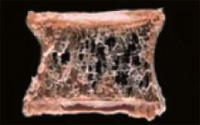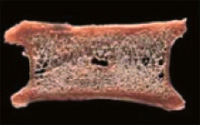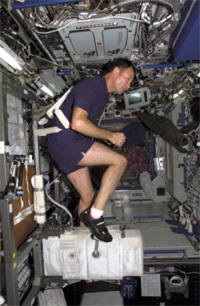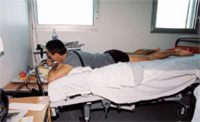This is an archive of information released in the past.
Disclaimer: It may contain broken links or outdated information. Some parts may not function in current web browsers.
*Visit https://humans-in-space.jaxa.jp/en/ for the latest information.

Experiment
- News
- Kibo Utilization Strategy
- Kibo Utilization Plan
- List of JAXA's Utilization Themes
- Experiment Facilities
- Space Environment Utilization
- Archive
Background

Figure 1. A Spinal Bone with Reduced Bone Density due to Osteoporosis

Figure 2. A Normal Spinal Bone
Bones support our bodies while we live on Earth. Gravity helps maintain bone mass because it puts a gravitational load on the bones when we move our bodies.
In space, where there is no gravity, the body does not need much support. As such, bone calcium is released from the bones into the blood and then into the urine about 10 times faster than in elderly osteoporosis patients. It is reported that bone density tests before and after a space flight show an about 1.5-percent-per-month loss of bone content in the femur. The calcium released into the urine, in turn, may form minute stones, resulting in urinary calculus. Moreover, bone loss leads to a reduction in bone strength, resulting in an increased tendency for bone fracture. Although ISS crewmembers perform exercise for two hours a day during their missions in space, this cannot completely prevent bone loss.
As Japanese astronauts have come to join ISS Expedition Missions, JAXA has been working on countermeasures for bone loss and urinary calculus during long-duration spaceflight. Subsequently, Dr. Toshio Matsumoto made a proposal that bisphosphonates, which are used to treat osteoporosis on Earth, might also be effective for prevention of bone loss in space.
Objectives
Using bisphosphonates, a ground-based experiment was performed. The European Space Agency (ESA), the Centre National d’クI鉛udes Spatiales (CNS), and JAXA jointly conducted the experiment in the form of a “bed rest” experiment from 2000 through 2001. In the bed rest experiment, subjects remained lying in bed for about 90 days to simulate the weightless conditions in space. The experiment evaluated various effects on the human body and determined the effectiveness of the countermeasures.
Subjects were injected with bisphosphonates two weeks before the start of the experiment. They showed no reduction in bone mass or increase in the release of calcium into the urine. At this time, JAXA decided to examine effectiveness of bisphosphonates in space.
Meanwhile, NASA has been proposing a bone loss countermeasure program that involves regular use of bisphosphonates in tablet form for ISS crew. Thus, Japan and the United States have agreed to start collaborative research on the preventive effects of bisphosphonates on bone loss and subsequent urinary calculus through pre-flight injections and in-flight oral administrations.
Experiments

Figure 4. An Astronaut Performing Exercise in the ISS
In the collaborative experiment, astronauts scheduled to stay aboard the ISS will be divided into two groups of subjects: those who will be injected with bisphosphonate before flight and those who will take bisphosphonate tablets during flight. Medical data will be collected before, during, and after the flight. The effects of both forms of medication will be evaluated.
The experiment will start when astronauts are informed about administration of the medication and give their consent.
Main Points of This Experiment !
The mechanisms and effects of the problems of muscle atrophy and radiation in the bodies of astronauts are now understood. Similarly, though the mechanism of bone loss is not yet completely understood, research has progressed to a clinical stage where attempts are being made to prevent bone loss in space with medications used to treat osteoporosis on Earth.
Bisphosphonate administration is expected to prevent bone loss in space and urinary calculus caused by calcium released from bones into the urine..
The medication will be an innovative preventive measure for the health management of astronauts who will join long-duration spaceflights in the future. NASA is also very interested in its effects.
Organization
 |
Principal Investigator (PI)
Toshio MATSUMOTO Professor, Institute of Health Biosciences, University of Tokushima Graduate School |
| Copyright 2007 Japan Aerospace Exploration Agency | Site Policy |
